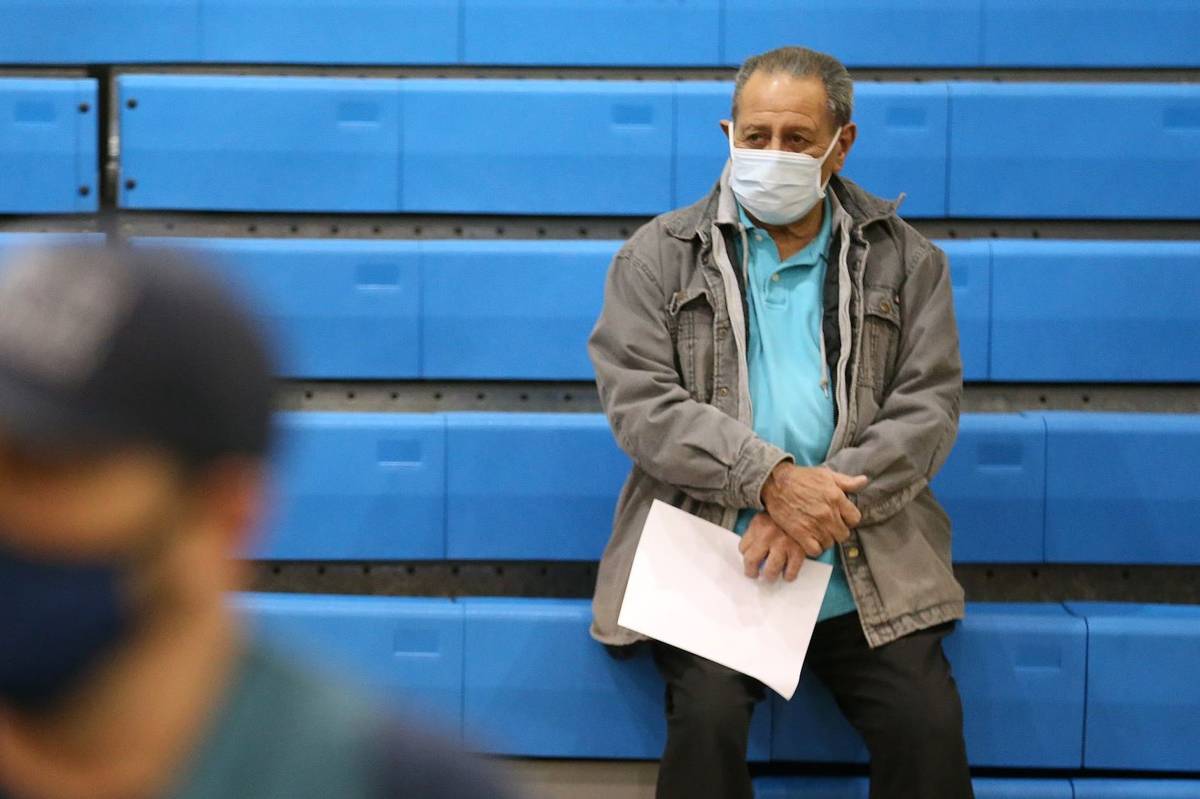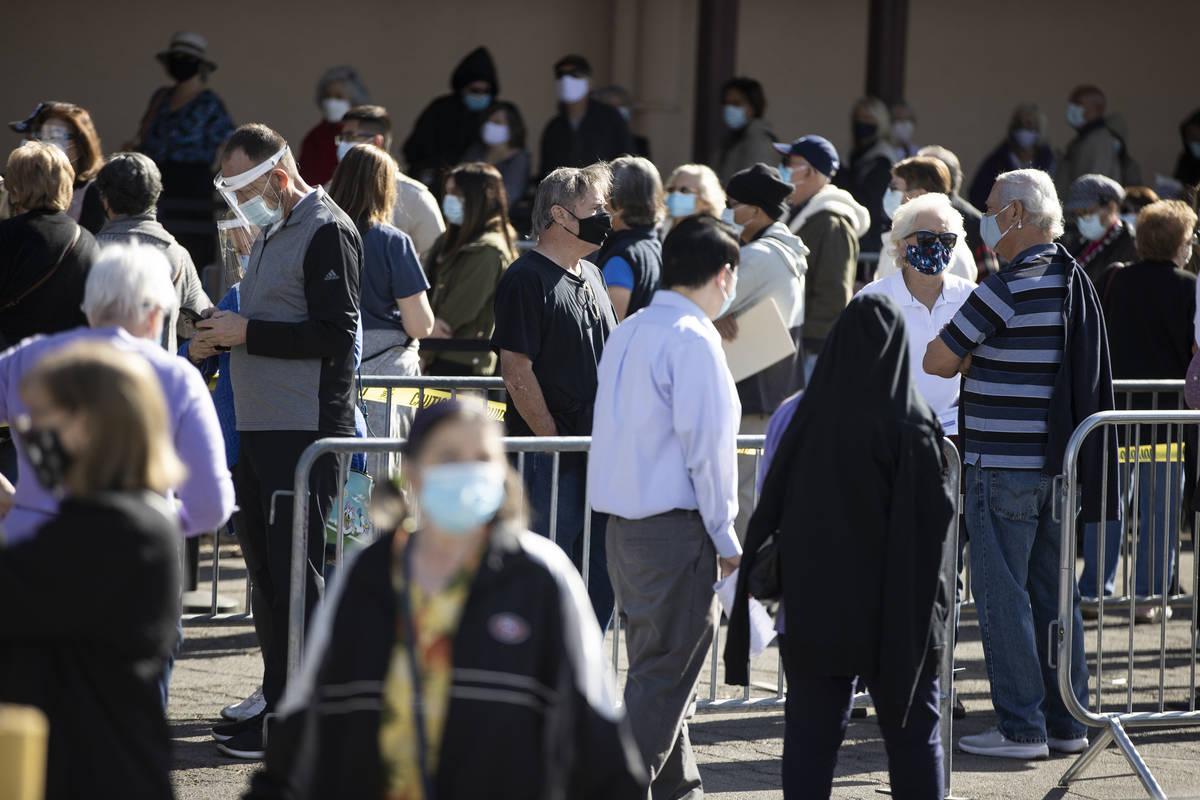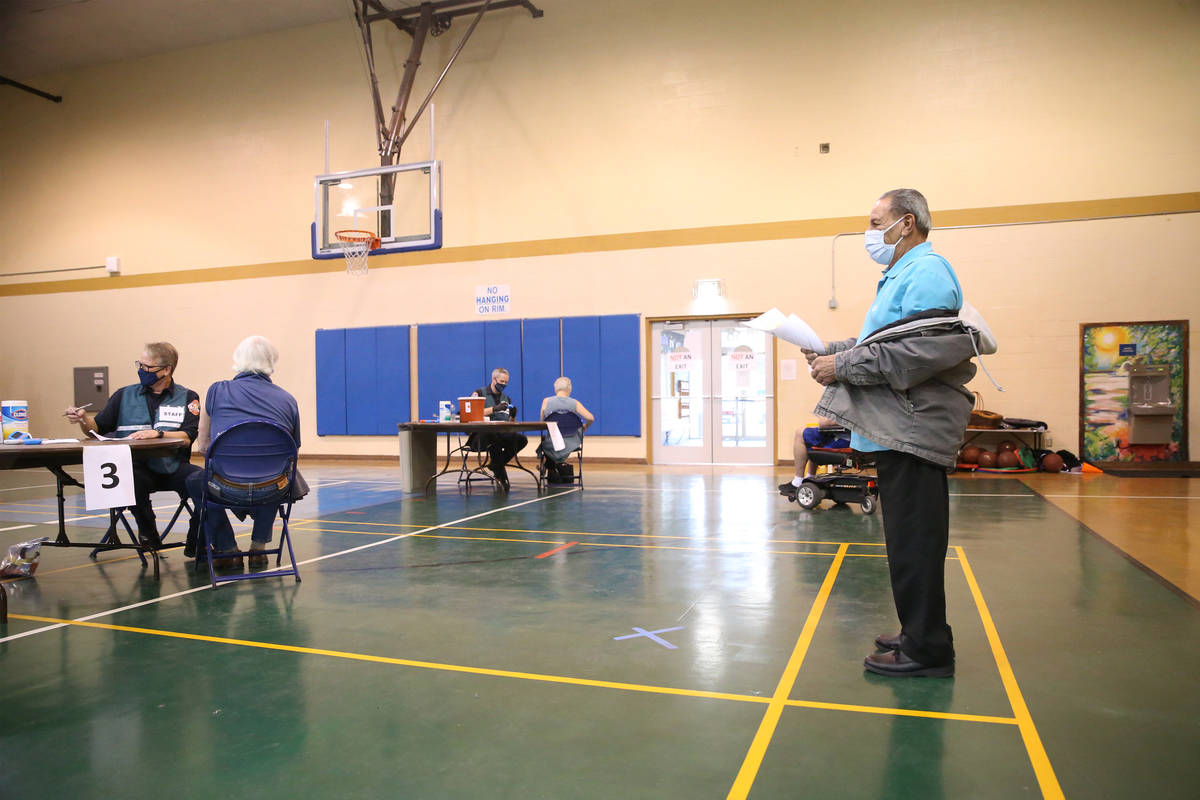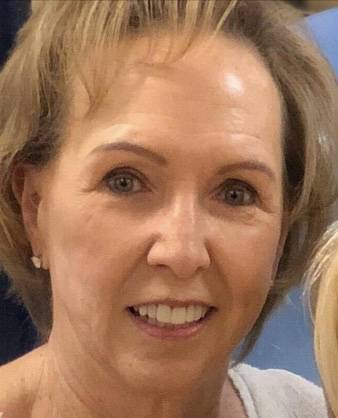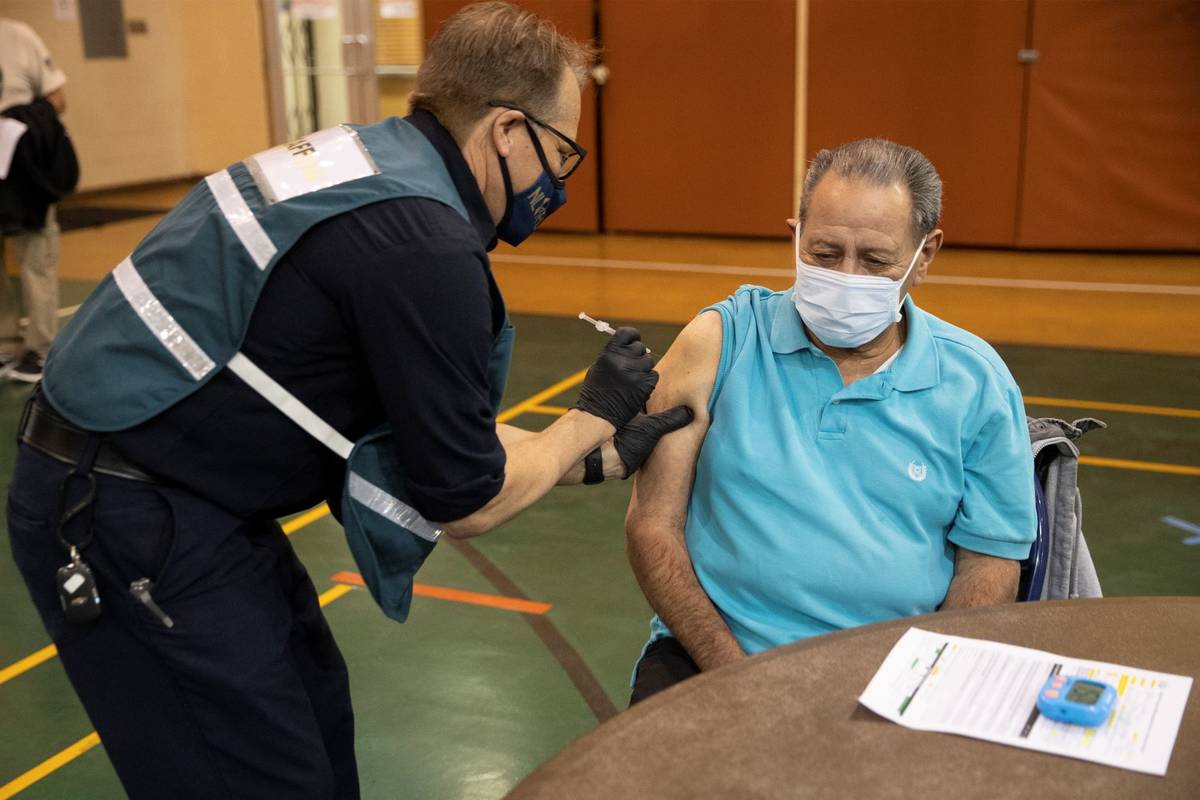Rollout plan for COVID vaccines leaves many frustrated, confused
The unexpected slowdown in Southern Nevada’s vaccine distribution announced Friday introduces more uncertainty about the state’s rollout plan.
In the 41 days since the state’s first dose was given to an intensive care unit nurse at University Medical Center, expectations have been high for a well-coordinated mass vaccination plan to protect Nevadans.
But what anxious residents eager for the potentially lifesaving vaccine have experienced is confusion and frustration in attempts to make appointments amid inconsistent communication from coordinating agencies. Many have spent days fruitlessly trying to book appointments, witnessed line-jumping and even have been turned away at vaccination sites.
Now sites are scaling back COVID-19 inoculations as Nevada continues to receive limited doses from the federal government, state officials said.
Las Vegas resident Beverly Myers, 77, said she and five family members have fruitlessly tried to schedule an appointment for her, checking registration portals at all hours of the day hoping to catch new openings. She is worried about other Nevadans her age who may have an even harder time signing up because they’re not computer savvy.
Elders, who face the greatest health risks from COVID-19, are seeking inoculation in Southern Nevada at the same time as officials have expanded the number of essential workers eligible to register. As of Jan. 18, the latest data provided, more than 60,000 doses had been administered in Clark County.
“I’m frustrated for myself, but I’m also frustrated for a whole lot of seniors out there,” Myers said. “Not everybody has a family that will help them.”
Nevada is one of many states that have had to ramp down immunization efforts amid a nationwide vaccine shortage.
Public concern here has been heightened after national numbers showing Nevada ranked last among U.S. states in vaccine doses administered per capita, according to Centers for Disease Control and Prevention data published Saturday. The state also ranked second-to-last in number of doses per capita shipped to the state.
State and local officials last week praised Nevada’s COVID-19 vaccination rollout. They asked for patience in the face of inadequate supplies of vaccines.
“We are off to a great start making COVID-19 vaccinations available in our community based on the supplies we receive,” Clark County Commission Chairman Marilyn Kirkpatrick said in a news release Friday.
Myers said her experience doesn’t reflect that.
“I’m not sure how the information is being disseminated to her and other political figures, but you only have to spend an hour trying to get an appointment for a few days and they would have a taste of our reality in the street,” she wrote in an email.
Vaccine shortage
Nevada is receiving approximately 36,000 doses per week from the federal government, less than a third of the doses that are needed to hit the goal of vaccinating 18,000 people daily, state COVID-19 response director Caleb Cage said Friday.
Cage said they would like to receive 126,000 doses per week. Clark County alone reports it can distribute 92,000 doses a week.
The Washington Post reported this week that Nevada was among a handful of states not ordering up to their limit of vaccine doses from the federal government. State officials maintained Friday they have ordered the maximum number of available first doses each week, and they were ordering second doses based on how many residents were due for their second shot.
In a new nationwide Kaiser Health News poll released Friday, almost two-thirds of adults said the federal government is doing a “fair” or “poor” job of distributing vaccines to the states. Nearly six in 10 people age 65 and older who have not yet gotten a shot said they don’t have enough information about how to get vaccinated, according to the survey. The Kaiser Family Foundation survey of 1,563 adults was conducted Jan. 11 through Jan. 18.
In a tweet Friday, Gov. Steve Sisolak said, “We will continue to fight for more doses to come into our State on a regular basis so we can continue to ramp up our distribution efforts and protect Nevadans.”
Technology glitches
The problems became apparent in mid-January, when registration opened for locals age 70 and older. Technology glitches hindered many from booking appointments on local government websites. Some received erroneous notifications stating they would need to wait until August.
Only a few days later, government agencies silently opened vaccinations to a large swath of essential workers with little or no notice to the public or media.
Prioritizations in the state’s vaccination playbook have not always matched what some workers are experiencing at vaccination sites. Some reported being turned away though they were in an eligible “lane” and had appointments.
Sarah Baxendell said her and her husband’s appointments at Western High School on Wednesday were not honored. Southern Nevada Health District employees at the site told them they weren’t vaccinating ride-share drivers, though state guidelines explicitly said such workers were eligible for vaccination.
Baxendell, 34, said they went to two more vaccination sites and were told the same thing. They can’t find another available appointment to sign up for.
“It is unacceptable for them not to follow the state guidelines,” she said. “Anyone who was eligible and had an appointment but was turned away, they need to make up those appointments.”
In contrast, residents without appointments have been allowed to access desperately sought doses, as health officials failed to properly screen them.
Las Vegas’ largest vaccination site, the Cashman Center in downtown, vaccinated people without an appointment Tuesday, the Review-Journal found. Many recipients said they had not been asked to show any form of identification to verify their age or employment, and some did not fit the current requirements for who is eligible to receive the vaccine.
When asked about the line-jumpers, Clark County officials initially maintained that appointments and identification were required. Later in the week, county Fire Chief John Steinbeck acknowledged failures in protocol had occurred and said security would be tightened at the site to make walk-ins “extremely minimal, if not totally nonexistent.”
In North Las Vegas, a government-run site also accepted walk-ins on Tuesday after several people failed to show up for their appointments. City officials said residents booked appointments at multiple sites and took the first one available. Walk-ins were accepted so that doses did not go to waste, officials said.
Despite the hurdles, state and local officials contend they have proved they can hold a successful mass vaccination campaign. The biggest challenge they face is obtaining more doses from the federal government.
Nevada has distributed more than 137,000 of the 212,000 some doses it had received as of Friday, said Candice McDaniel, who leads Nevada government’s vaccination efforts. Nevadans who have received their first dose are not in jeopardy of missing their second, she said.
The shortage led the Cashman Center site to temporarily close this weekend to ensure enough doses were available for the needs of other local vaccination clinics.
Officials initially said the closure was to better train staff and improve operations, but they later revealed it was also to ensure limited doses could reach other community clinics that had scheduled appointments.
The city of Henderson on Friday postponed vaccinations scheduled during the first half of February because of supply shortages, promising to honor the appointments at a later date, according to an email sent to registrants.
Nevada is not the only state facing sudden vaccine shortages. Across the U.S., worried health officials are facing vaccine supply problems and closing inoculation sites. In Los Angeles, there is concern that Los Angeles County residents won’t be fully inoculated until 2022 unless vaccine supplies get a major boost, the Los Angeles Times reported.
But some less-populated states have been successful in administering their allotted vaccine supply.
CBS reported West Virginia has distributed nearly 90 percent of its supply of the the first vaccine shot. The state also leaned heavily on its National Guard to lead other state agencies in vaccination efforts and transport doses to sites, the report said. CBS also listed North and South Dakota as doing a good job getting residents vaccinated. As of Jan. 14, South Dakota had administered 60 percent of the vaccine, according to CBS citing CDC data.
Cage said the governor and the state’s congressional delegation were exploring “every avenue that we possibly can in order to make sure that the situation is rectified.”
He added that the state hopes the number of doses allotted each week will increase under President Joe Biden’s new vaccination plan, which aims to administer 100 million shots during his first 100 days in office.
“We’re extremely encouraged by what what I see as a unified and coherent national strategy to address not just vaccination, but also COVID-19,” Cage said.
Contact Michael Scott Davidson at sdavidson@reviewjournal.com or 702-477-3861. Follow @davidsonlvrj on Twitter. Review-Journal staff writers Mary Hynes, Mick Akers and Mya Constantino contributed to this report.



